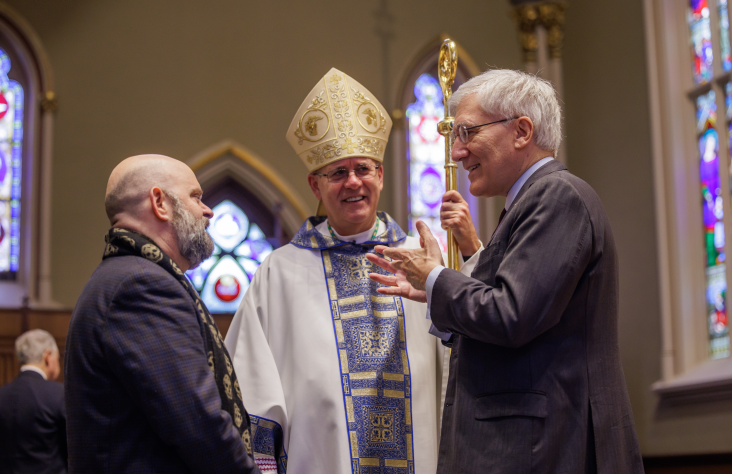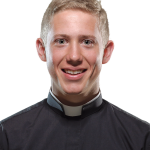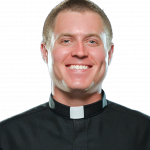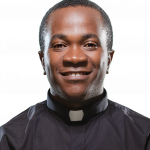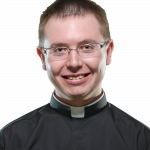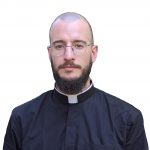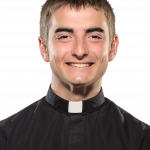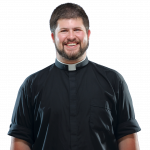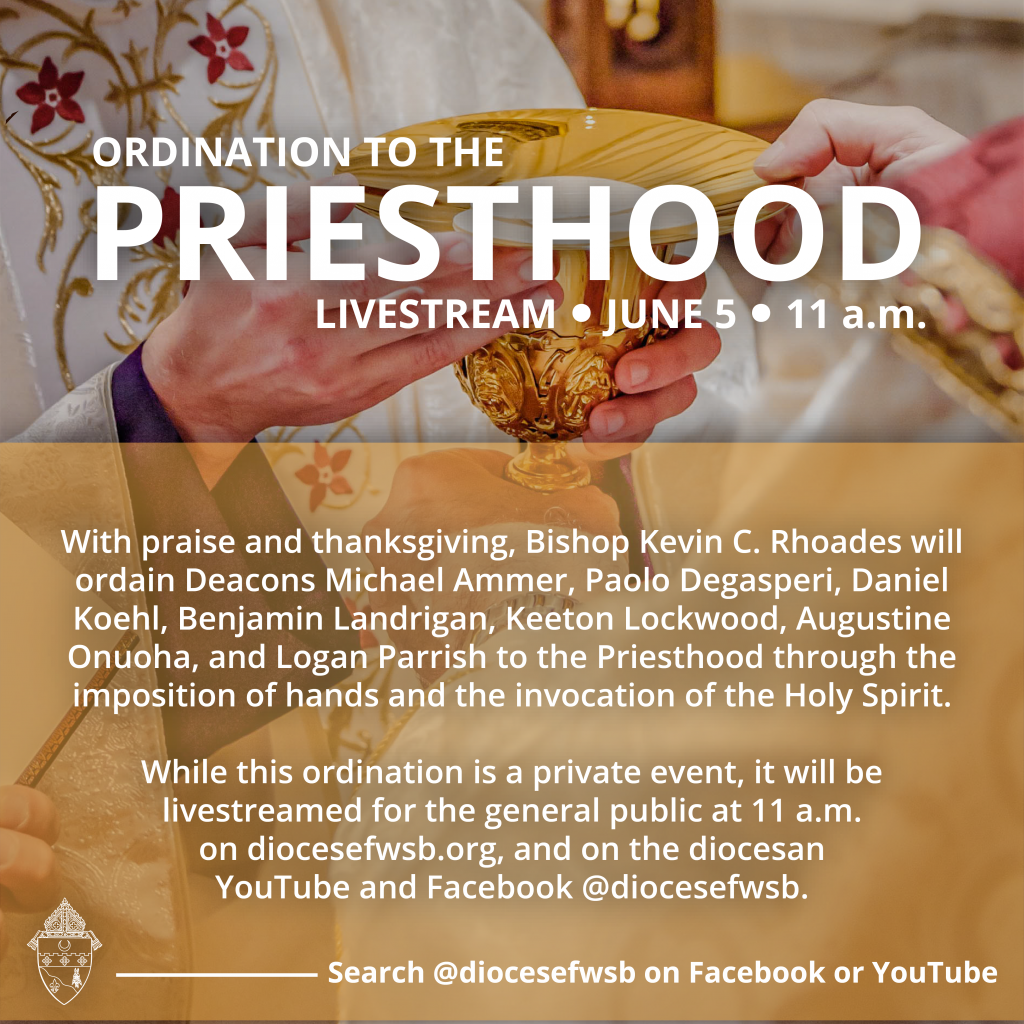May 25, 2021 // Diocese
Priesthood candidates anxious to be transformed by God’s grace
FORT WAYNE — A tremendous blessing for the Diocese of Fort Wayne-South Bend will take place June 5, at the Cathedral of the Immaculate Conception, Fort Wayne. Seven men will commit their lives to serving the Church, Bishop Kevin C. Rhoades and the faithful of the diocese in the vocation of the holy priesthood.
Each has been formed in wisdom and charity and is looking forward to serving in love the parishes to which they are assigned as priests. Among the record number of candidates for ordination — at least in recent history — are four from the same faith community, St. Vincent de Paul in Fort Wayne. Deacon Augustine Onuoha, Deacon Daniel Koehl, Deacon Keeton Lockwood and Deacon Logan Parrish all call the parish home.
In addition, St. Elizabeth Ann Seton Parish, Fort Wayne; Most Precious Blood Parish, Fort Wayne; and St. John the Baptist Parish, New Haven; are rejoicing in the vocations of their sons Deacon Benjamin Landrigan, Deacon Paolo Degasperi and Deacon Michael Ammer, respectively.
The ordination Mass will begin at 11 a.m. but is closed to the public due to social distancing requirements. It will be livestreamed on the diocesan YouTube channel.
Deacon Benjamin Landrigan
Q When did you first know you wanted to become a priest?
A “The earliest I remember thinking about it was when I was in grade school, and I read these lives of the saints books we had at home,” Deacon Landrigan recalled last year. He was drawn to the saints from that time on, fascinated by the purpose in their lives and by their holiness. He knew he wanted to be a saint and that he wanted to go to heaven, and he saw that many of the male saints he admired were priests. “So that was when that idea started in my head. I never stopped wondering about it after that. I was just always thinking about it.”
Q What were the Catholic traditions of your family, growing up?
A The sixth of seven children, Deacon Landrigan grew up in a household that was deeply Catholic. He spent his life steeped in the faith, including nightly family dinners, discussing topics concerning the faith throughout the week and watching movies about saints. His family began praying the rosary together daily when he was in middle school. Faith “was part of the atmosphere at home.”
His parents, Daniel and Linda Landrigan, as well as his older siblings, inspired him to be active in the Church. The family is involved in ministry at their home parish of St. Elizabeth Ann Seton in Fort Wayne, and Deacon Landrigan has always loved being an altar server. Being around the holy sacrifice of the Mass in a closer way helped deepen his connection to the priesthood.
This deep love led him to volunteer to serve at Masses and weddings whenever a server was needed. For about 15 years, he served at every Easter Vigil Mass at St. Elizabeth, the only exception being the year he served for the bishop instead.
Q What moved you to apply to the seminary?
A After graduating from Homestead High School in 2014, Deacon Landrigan was accepted to enter the seminary. He credits the guidance of former St. Elizabeth pastor Father James Shafer, with whom he met almost monthly, with developing his vocation; as well as the influence of young priests such as Father Andrew Curry and Father Benjamin Muhlenkamp, who served as pastoral associates at St. Elizabeth.
“Father Drew was the first priest I had interacted much with on a personal level,” Deacon Landrigan stated.
His time in the seminary cemented his devotion to the priestly life. At Mount St. Mary’s in Emmitsburg, Maryland, he grew closer to his seminarian brothers. He makes it a point to keep in contact with them.
The biggest challenge he has had to face in seminary was not the rigorous academics but accepting the knowledge that he was ready to fulfill many of the priestly duties.
“I was intimidated by the ideas of visiting someone who was dying or someone who had dementia, or teaching in a classroom full of kids,” Deacon Landrigan confessed. But he feels his experiences in the seminary have prepared him for the more difficult aspects of priesthood. “Over the years, I’ve grown to love those things that used to intimidate me.”
Q What do you most look forward to about being a priest?
A Bringing the sacraments to other Catholics, Deacon Landrigan answered.
“Ultimately, that’s what it’s about: living a life of purpose and meaning that is only found in God. That’s what everyone wants; everyone looks all over the place, but we’ve got the real answer here, in the Church.”
It does feel a bit surreal, he added, since he has been waiting to commit his life to God for so many years. There were times he wondered if his call was from God or simply his own longing.
“I’ve always thought it was good for people to know that God can call you in simple and ordinary ways. A lot of times people are looking for the extraordinary sign, and they can really wrestle with the idea that God can work in their ordinary life.”
Q Who are the saints close to your heart?
A Two priestly examples stand out, he said: St. Edmund Campion, a Jesuit priest and Catholic martyr in England under the reign of Queen Elizabeth I, and Maximilian Kolbe, saint of Auschwitz. Deacon Landrigan first read about St. Edmund as a child in the adoration chapel at St. Elizabeth. St. Maximilian had such an influence on him in middle school that he chose Maximilian as his confirmation saint.
Deacon Michael Ammer
Q Have you always heard the calling to be a priest?
A Not always, said Deacon Ammer. It has been a gradual, patient journey. “But definitely for about six years now.”
Hailing from St. John the Baptist Parish in New Haven and a supportive Catholic family, Deacon Ammer originally wanted to teach physics, he said. In high school, he began to appreciate “the reality of diving deeper, figuring things out, understanding how things work” and the critical thinking abilities that accompanied the science. His drive to learn turned out to be not only applicable to his degree, but to his life as a disciple of Christ.
Q Tell us about the journey from physics to a vocation.
A Deacon Ammer’s education at Indiana University-Purdue University Fort Wayne introduced him to friends of varying faith traditions and denominations. When he saw a need to articulate his own faith, he dove into learning it seriously and deeply. The idea of a priestly vocation quietly surfaced; he recalled it following him as he pondered his path after graduation.
Ultimately, Deacon Ammer decided against teaching physics with his new degree and began to wrestle with a subsequent aimlessness. He said he considered pursuing engineering but did not find peace in the decision. At the conclusion of the summer after graduation, “Everything opened up. I had no school, no job, no girlfriend, no nothing. That’s when God really hit me over the head and said it was time to really consider the priesthood.”
He briefly taught mathematics at Northrop High School, Fort Wayne, while his decision to answer to the call became clear. He wanted to further discern the priesthood and, seeing the present moment as the most acceptable time, dedicated himself to daily prayer and adoration.
Six months later, Deacon Ammer’s outlook on his vocation had transformed. “God showed me where I needed to go and changed my heart to wanting the priesthood. I was willingly and happily applying to the seminary.”
Q Who were your spiritual resources as you discerned the call and studied in the seminary?
A “In seminary, I had a few priests who gave me spiritual direction, and they guided me in my discernment. There are countless spiritual books that helped me grow closer to God and helped me discern my vocation, too. One book that was given to me while I was discerning before seminary was “To Save a Thousand Souls,” which is written to help men discern whether they should enter the seminary. It helped me work through some things that stood in the way of me going to seminary. At this time, Father Andrew Budzinski, the vocation director, helped me discern, along with Fr. Daniel Whelan, who gave me direction and helped guide me.
“During the summer after two years in the seminary, the question of priesthood was heavy on my heart. It was very providential that my summer was spent in Omaha, Nebraska, at the Institute of Priestly Formation, which is a spiritual summer for diocesan seminarians and clergy. This summer gave me a lot of tools in prayer and helped me grow closer to God and helped me move from discernment to decision.
Throughout the last few years in seminary, I stayed the course with the help of my spiritual director and formators. Last year, during my deacon ordination, God gave me the grace to say yes. That is when my discernment to the priesthood ended.”
Q How has your diaconate year helped to prepare you?
A “I know it has been God’s hand, leading me step by step.” He has enjoyed being a deacon, he said, especially being present to people by preaching and administering the sacrament of baptism in his parish assignment.
Even within the ministerial context amid the COVID-19 pandemic, Deacon Ammer is hopeful he will be able to use his critical thinking and patience to continue evangelizing and meeting the needs of the faithful.
Deacon Augustine Onuoha
Q For how long did you hear the call to be a priest before you entered the seminary?
A “I can remember that it was at the age of 10 that I felt God’s call to the priesthood.”
The third of four children, Deacon Onuoha said the call came after years of devout attentiveness and participation at Mass. Not only did he serve as an acolyte, but he “would always sit at the front pews of the church, admiring how my pastor celebrates the Eucharist with so much love and dedication.”
“My parents are very devout Catholics, and my upbringing was deeply rooted in Catholic tradition.” His father, Patrick Onuoha, died when Augustine was 4 years old. His mother, Felicia Onuoha, is a nurse and teacher. Although he wanted to become a teacher or a medical practitioner like his mother, Onuoha said that the “zeal for the Catholic priesthood” was still present in him.
“Having discussed this with my home pastor, who sent me on a vocation discernment retreat, my strength and courage of becoming a Catholic [priest] was reinvigorated.”
Q What was the path of your formation?
A Deacon Onuoha attended Assumpta Minor Seminary and St. Paul’s International Secondary School in Imo State, Nigeria, where he was born and raised. After high school, he proceeded to attend St. Joseph Major Seminary in Ikot-Ekpene, Nigeria, studying philosophy from 2009-13. Only a few years later, his pursuit of vocation to the priesthood brought him to the Diocese of Fort Wayne-South Bend, thousands of miles from home.
“After first-year theology in 2015, I proceeded to University of Dayton, Ohio, to acquire [a] master’s degree in theology before I was accepted by His Excellency Bishop Kevin C. Rhoades,” he said. “I am sure that God brought me to this diocese to serve God and our people. In my prayers, imagination, daydreaming and the reading of the Gospels, I find myself remaining in this desire of becoming a Catholic priest.”
Q How has your diaconate year helped to prepare you for ordination to the priesthood?
A Deacon Onuoha said he really felt grateful for the opportunity to begin “serving our people in love, sincerity, docility and disposition” as a deacon, configured to Christ as servant. He fully embraced his responsibility to “proclaim and preach the Gospel, baptize, witness marriages, take the Eucharist to the sick, celebrate funeral and burial services and pray the divine office for the intention of the Church and her members.”
“I have met very wonderful people and priests in my life who have encouraged me in this journey thus far.”
Q Who or what has guided you spiritually along the way, as you prepared for your priestly ministry?
A Deacon Onuoha said that once the desire to become a priest was ignited in him as a young boy, he watched his pastor celebrate the Eucharist with love and dedication. “That same love for Jesus and the Church burns within my heart, and I can’t wait to share this love with people as a priest.” He has a devotion to St. John Paul II, St. Therese, St. Padre Pio and St. Mother Teresa of Kolkata, who have guided him along the way.
Deacon Keeton Lockwood
Q What was your earliest awareness that God might be calling you to a priestly vocation?
A In the sixth grade, Keeton Lockwood first heard God’s call to consider the vocation of religious life. He had just moved from Auburn to Fort Wayne and joined St. Vincent de Paul Parish. There, he met Msgr. John Kuzmich and began going to daily Mass.
“The way he would celebrate Mass and draw people to God opened my eyes, heart and soul to Him. Seeds were planted within me then.”
He attended Bishop Dwenger High School in Fort Wayne, continued going to Mass regularly and began praying every day. His prayer was ordinary, he said, just “talking to God, sharing the joys and frustrations of the day, thanking Him, spending 15 minutes in the morning or evening.”
After high school, he applied to enter the seminary, wanting to respond and answer God’s call. He was asked to wait a few years, go to college, gain some more life experience and grow.
Deacon Lockwood now looks back on that period as a time of particular grace.
“That’s when I really became active in my parish, at St. Vincent. I served as a sacristan and joined a discernment group with Father Andrew, who really helped me hone my desires and work through my thoughts and feelings of a vocation.”
Q How did your family support your calling?
A “They gave me real-life examples in how they loved others, person to person in relationship and carried themselves through life.”
Q Would you tell us about the experience of your formation in seminary?
A In 2014, Deacon Lockwood reapplied and was accepted by Bishop Rhoades as a seminarian for the Diocese of Fort Wayne-South Bend. He attended the Pontifical College Josephinum in Ohio for the next three years. During that time his mother passed away, and his home parish of St. Vincent de Paul, Fort Wayne, became a second home.
He earned a Bachelor of Arts degree in philosophy and then studied morality and sacred Scripture at Mount St. Mary’s Seminary in Emmitsburg, Maryland. “Analyzing the Pentateuch and Gospels and how they connect was one of my favorite courses.”
Q What does your prayer life look like?
A Deacon Lockwood said his prayer life takes a variety of forms now, from a daily holy hour in front of a tabernacle or exposition of the Eucharist, to Lectio Divina, a daily rosary and the Litany of the Hours five times a day. Sometimes his prayer is communal, such as the Divine Mercy Chaplet or rosary; at other moments it’s individual. Both allow him to delve deeper into relationship with God who created, saved and sustains him, he said.
Q What are you anticipating most highly as a priest?
A He served a diaconate year at St. Joseph Parish, Fort Wayne, assisting with baptisms, preaching at Mass and speaking with children completing the Rite of Christian Initiation of Children. He is looking forward to preaching both in English and Spanish, through which “I can connect with people in a large group and share our faith.”
Q Who have been your spiritual mentors as you prepare for ordination?
A Excited for this next stage of growth, Deacon Lockwood said he is grateful for all he has been given. He particularly hopes to be able to minister and share God’s love with His people. St. Benedict Labore, his confirmation saint, and St. Mother Teresa of Kolkata are both models of how Deacon Lockwood feels called to serve, with a special love for the poor and homeless.
He recalled riding along with his mom when he was young, and asking, “Can we help them?” upon seeing someone begging on the side of the street. “She always would share some groceries or money to buy some fast food, planting the good seeds of service and God’s charity and love” — which now are clearly flourishing in her son.
Deacon Paolo Degasperi
Q What were the influences that encouraged you to consider religious life?
A The Franciscan tradition appealed to a young Degasperi because of the influence of his older brother and sister, both of whom joined a Franciscan order. They had been born in Trent, the city in which the ecumenical Council of Trent, the event that spurred the Catholic counter-reformation, took place.
“My brother became a friar when I was 10 or 11. So I think they were — especially my brother — very instrumental both in helping me grow in my faith, and to know my faith well.”
Deacon Degasperi spent most of his high school and college years resisting the call to the religious life. But by the end of college, he had to make a decision.
“At this point, it’s becoming a serious thing. And so, I just started to pray again, to be open to the possibility. When I did that, I just knew,” he stated. He joined a Franciscan order in Italy at age 22.
Q How did you come to be in the Diocese of Fort Wayne-South Bend?
A The order began to experience disunity, Deacon Degasperi said. “I knew he needed to find a better fit. I was losing the enthusiasm, losing the conviction about my call because of that situation. In order to preserve my vocation as a whole, I started to look around to see if there was another place I could go.”
He knew about the community in Fort Wayne and was invited to spend a summer there, which he did. The fraternity of the Poor Brothers was what he had been looking for. But after nearly 10 years as a Franciscan brother, Deacon Degasperi, who had been known as Brother Felice, and many of his brothers decided it was time to move in a different direction. The order disbanded, although by this time he was among the brothers studying for the priesthood at Mount St. Mary’s Seminary in Cincinnati.
Q Why did you make the decision to become a priest?
A St. Therese of Lisieux, to whom he has a strong devotion, played a part in the decision. When he arrived at the community’s former home at St. Andrew Church, he found a small statue of a female saint in his cell. At first, he couldn’t tell who she was. “I saw the cross and the roses. It was St. Therese … So that was little sign that I was supposed to be here for this time.”
Degasperi and several of his religious brothers had already begun studying for the priesthood at Mount St. Mary’s Seminary in Cincinnati, when the community agreed to disband due to personal discernments. The influence of diocesan priests he has encountered in Fort Wayne played a strong role in helping him discern a vocation to the diocesan priesthood, so he applied and was accepted.
“The good thing about coming to Fort Wayne was to experience very faithful priests — very normal, very young. Their life can be appealing to young men,” he said. Part of this realization came about during a summer assignment at Most Precious Blood Parish in Fort Wayne, where he served among the laity, “comforting them and helping any way I could.”
Q Did being a religious brother assist in discerning your priestly vocation?
A Absolutely, said Deacon Degasperi. His years as a Franciscan brother have given him a strong foundation for the priesthood. “The witness of someone wearing a religious habit or clerical garb is just a sign that speaks a lot to the presence of God.”
He points to his transformation in the last 10 years and how the “intense spiritual life” ingrained in him as a Franciscan has increased his ability to be a good priest. “Sanctity, for a priest, is not just about himself; it’s not for his own sake so much, but it’s always for the sake of others. A holy priest changes lives more than a lukewarm one.”
Although his discernment process is unusual, Deacon Degasperi still sees the essence of the diaconate as a matter of service. “That’s really the priesthood for me, the most exciting thing: the fact of becoming — unworthy and unprepared as I am — an instrument in the hands of Jesus.”
Q What are you most looking forward to in your vocation?
A Preaching and sharing the wisdom he gained during his time as a brother, Deacon Degasperi said.
Deacon Logan Parrish
Q What does becoming a priest mean to you?
A Deacon Parrish said he is drawn to the fatherhood aspect of the priesthood. His devotion to St. Joseph as spiritual father and the examples of other young priests gave him a greater desire to also become a spiritual father to young people.
“Certainly, the means of fatherhood is the sacraments, but I think that as Father Daniel (Scheidt) says, ‘You can’t get any title better than father.’”
Q How did you first hear the call to the priesthood?
A It was a seemingly innocuous process at the beginning, Deacon Parrish remembered.
While a student at Bishop Dwenger High School in Fort Wayne, he became involved in several school sports. But in the fall of his sophomore year, he felt a change in his spiritual life during a retreat at his home parish of St. Vincent de Paul.
“At the end of the retreat, one man said, ‘you guys should pray every day’ and it just seemed so reasonable that I thought ‘OK, I guess I could do that.’ So, I started praying a decade of the rosary every day in the chapel at Dwenger.”
He began inviting friends to join him in saying a decade before lunch. This time of prayer brought him immense joy, he said. “That sort of devotion and fostering of love for the Lord was beautiful.”
During his senior year, then-chaplain Father Jacob Meyer began asking the school’s altar servers if they had ever considered seminary and said they should follow any perceived call if they felt even the slightest nudge. Deacon Parrish joked, “I think I received an application like four times,” including one from Bishop Rhoades.
After his first year of college and following a breakup with a girl he had been dating, while driving home afterward, he felt a nudge to go to the Mary alcove at St. Vincent. He stopped and knelt before the statue, giving her his joys as well as the pain of his breakup. As he finished a rosary, the weight was lifted from him.
“I’ve heard it said that the Lord takes our good to give us better. That really rings true. Never could I have imagined a better candidate for motherhood, a woman that I would have desired to start a family with — I had that image of marriage. Never would I have thought that the Lord would have wanted to give me something better than that.”
Q What has been your journey as you followed God’s calling?
A Deacon Parrish transferred from Holy Cross to Mount St. Mary’s Seminary in 2015, completed his formation and was ordained to the diaconate June 20. The friendships he had made in high school stayed with him, though, and whenever he sees them, he speaks about the seminary, urging some to reconsider the vocations they had felt called to in high school. The friendships fostered on the sports teams and in the chapel at Bishop Dwenger were the same ones that helped him recognize his vocation to the priesthood, he noted.
Q During your discernment, who has been your support and inspiration?
A Deacon Parrish is the oldest of 10 children. He said his parents, Bill and Mary Jo Parrish, are supportive of his vocation and eager to attend his ordination.
“The faith and growth in faith that I witnessed in my own household over the years made a deep impression,” he said — particularly watching his father’s faith journey.
Many holy men also influenced Deacon Parrish throughout his life: particularly “the energy and invitation of Father Jacob (Meyer),” the stability and priestly image of Msgr. Kuzmich and the holiness of former Bishop John M. D’Arcy” helped him make his decision.
Deacon Daniel Koehl
Q Who were the early influences in your decision to enter the seminary?
A “I have a very supportive family. They have always been there for me and have been behind me through these many years of seminary formation. I can’t thank them enough,” Deacon Koehl said last year.
His mother and father are practicing Catholics, which he said played a critical role.
“One of the really beautiful aspects of this upbringing is that the Catholicism in our family was just a given. It was never any question of whether or not we were going to go to Mass on Sunday, or if we were going to pray before meals and bedtime. I was never asked if I would like to go to the public school instead. My parents knew what was best for me and taught me to live accordingly.
Deacon Koehl attended St. Vincent de Paul School, in the parish where he was raised, and then Bishop Dwenger High School. Upon graduation in 2011, he began to study engineering at Purdue University, West Lafayette, but after two years discerned God’s call to enter the seminary.
“The faith was seemingly always the backdrop on my life. My younger brothers have always shown me the greatest support. Both are young adults now and our friendship only continues to grow. It is especially edifying when they, though younger than me, teach me something about being a faithful Christian man. I have received so much affirmation and support from them over these years I’ve been in seminary. They make it pretty easy to be a big brother.”
Q Were there other examples of priestly ministry that encouraged you?
A Koehl is grateful for the leaders of his parish youth group, because they taught him that Jesus was alive and a person who wanted a relationship with Him.
“As many vocation stories go, there were perhaps many small signs, or at least influences, which led to a greater level of discernment in the seminary. For example, when I was in middle school, I learned to serve at Mass. On Sundays, I would very frequently stop at the sacristy to ask the priest if he needed any more servers. As a result, I began to serve Mass so frequently that many friends and family began to call me ‘Father Danny.’ At the time, I just laughed at them, but today I realize the importance that serving Mass, being in the sanctuary with the priest, really had on me. It taught me the beauty of holiness and gave me a special insight into what it meant to be a priest.
There was one priest who was a spark to his discernment, but it only takes a spark to start a fire, he told Today’s Catholic.
“The late Bishop John M. D’Arcy was the first person I ever heard say the word ‘vocation.’ He set forth in my very young mind the idea that God is calling me to holiness in a certain way of life. I hope that that initial message will bear great fruit in my life as a deacon and priest.”
Another time, during a high school retreat, there was time set aside for the sacrament of reconciliation.
Koehl said he made a very good examination of conscience, to the extent of picking through his life and finding all the sins and habits that put up barriers between the Lord and him. He recalled that when the priest was saying the words of absolution, he had a very clear sense of the presence of Christ in the priest.
“In that moment, it was as if Christ was offering me the seat on the other side of the confessional, to be an instrument of mercy for others as His priest. A great peace washed over me and, from that point on, I always sort of knew that I would be a priest, even if I made it there by an indirect route.”
Q Who are your favorite saints?
A. When the Office of Vocations asked the question recently, Deacon Koehl had a comprehensive list.
“St. Maria Goretti, St. Edmund Campion, St. Thomas Becket, St. John Cassian, St. Benedict, St. Pius X, St. Pius V, Blessed Stanley Rother, Blessed Solanus Casey, Blessed Karl of Austria, St. Daniel the Stylite, St. Patrick, St. Edward the Martyr, Blessed Pier Giorgio Frassati, St. Anthony.”
For resources to help discern a vocation, visit diocesefwsb.org/vocations.
The best news. Delivered to your inbox.
Subscribe to our mailing list today.


